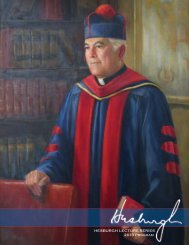HESBURGH LECTURE SERIES 2012 Program - Alumni Association ...
HESBURGH LECTURE SERIES 2012 Program - Alumni Association ...
HESBURGH LECTURE SERIES 2012 Program - Alumni Association ...
Create successful ePaper yourself
Turn your PDF publications into a flip-book with our unique Google optimized e-Paper software.
Mark W. Roche, Ph.D.<br />
Rev. Edmund P. Joyce, C.S.C., Professor, German Language and<br />
Literature; Concurrent Professor, Philosophy; Fellow, Nanovic<br />
Institute for European Studies<br />
Biography<br />
Mark Roche is the Rev. Edmund P. Joyce, C.S.C., professor of German language and literature<br />
and concurrent professor of philosophy. He served as the I. A. O’Shaughnessy Dean of the<br />
College of Arts and Letters from 1997 to 2008.<br />
Categories<br />
Lectures<br />
Art/Architecture, Education,<br />
Spirituality<br />
The Greatness and the Limits of the Ugly in Art<br />
Within modern art, the concept opposite the beautiful, the ugly, has gained a strange prestige — what is its function in enhancing<br />
the expressivity of art? What has been the special role of Christianity in this development? How can a work that portrays physical<br />
or moral ugliness, whose form is distorted, and whose parts seem to be at odds with one another be considered great art? In<br />
evaluating controversial art, how can we distinguish between great art that integrates the ugly and bad art? The lecture includes<br />
images from both Christian and modern art.<br />
Jokes and Their Relation to Reason<br />
This entertaining presentation interlaces a number of jokes with comments on the ways in which jokes play with various kinds of<br />
paradoxes, contradictions, and hidden meanings.<br />
Religion and Intellectuals<br />
Why do so many educated people lose their faith? What arguments seem to speak against religion, and how are these arguments<br />
to be weighed? The presentation considers these issues along with the questions, “what paths to religion exist for the educated<br />
person?” and, “which seem to be the most promising?”<br />
Why Choose the Liberal Arts?<br />
This lecture considers three partly overlapping grounds of a liberal arts education: first, its intrinsic value, or the distinction of<br />
learning for its own sake, the sheer joy associated with exploring the life of the mind, and asking the great questions that give<br />
meaning to life; second, the cultivation of those intellectual virtues that are requisite for success beyond the academy, a liberal arts<br />
education as preparation for a career; and third, character formation and the development of a sense of vocation, the connection<br />
to a higher purpose or calling.<br />
The Hesburgh Lecture Series, <strong>2012</strong> <strong>Program</strong> 97



